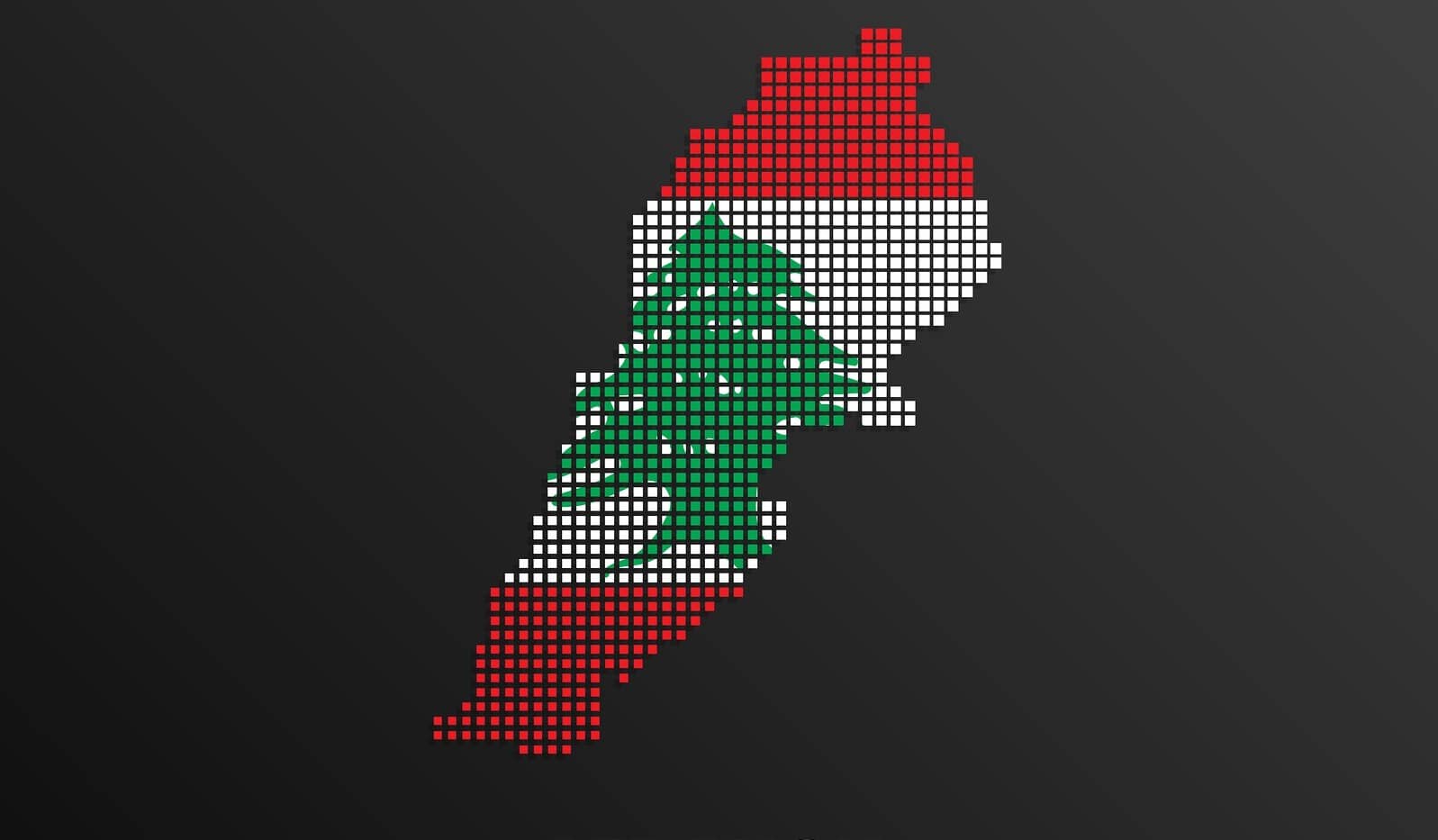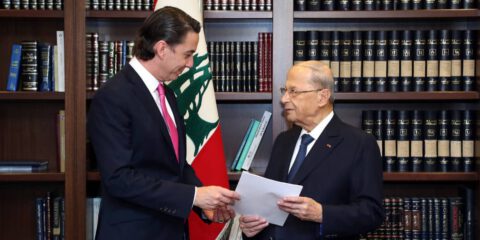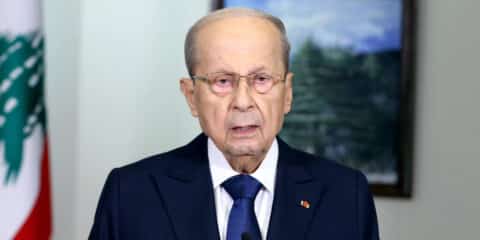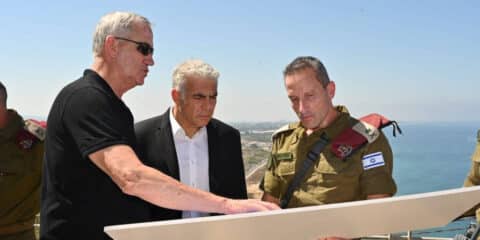Hezbollah’s leadership has come to realize that harsher US sanctions pose a serious threat to the revolutionary regime in Tehran. It will become increasingly difficult for the regime to finance the full spectrum of its revolutionary ambitions. Hezbollah has therefore had to focus on securing its own sources of funding and providing employment for its members and followers through ever-deeper engagement in Lebanon’s economic and financial spheres of activity.
Hezbollah has traditionally viewed itself as responsible for the resistance to Israel within Lebanon. According to an unwritten agreement between Hezbollah and the Al-Mustaqbal party, which heads the country’s Sunni community and from whose ranks prime ministers are appointed, resistance comes under the purview of Hezbollah while Al-Mustaqbal and the Al-Hariri family members who head the party are responsible for the economy. Recently, however, Hezbollah has declared its intention to enter the realm of economic, monetary, and public administration of the country and seek partial control in these spheres or, at the very least, limit the control of other political parties, particularly Al-Mustaqbal. This occurred after Hezbollah had already gained control of the parliament in the May 2018 elections, as well as control over any future government headed by Saad al-Hariri (as was the case in all the governments during the past decade). Hezbollah achieved these successes through a network of political alliances.
In a speech broadcast on the Al Manar television channel in March 2018, the leader of Hezbollah, Hasan Nasrallah, demanded reforms within the economic and monetary spheres and in public administration, with an emphasis on combating corruption, on the grounds that the state should be made strong. This demand for reforms by Hezbollah, which is known to be corrupt, raises questions and concerns regarding the real motives behind its move. The Hezbollah-affiliated Lebanese press revealed some of the motives behind this announcement, but an analysis of Lebanon’s internal, regional, and international issues as they relate to Hezbollah can reveal additional factors. The organization’s recent move also has significant implications and far-reaching potential repercussions for Lebanon and its foreign relations.
Statements by Nasrallah and Members of His Organization
In his televised speech Nasrallah presented his party’s election platform and announced his intention to promote reforms in the political system, public administration, and the financial-monetary sphere, and to become far more involved in the country’s economic and socio-economic systems. Nasrallah elaborated on some of his plans: on the one hand, to fight against the corruption and waste in public administration that he and many others claim exists in Lebanon; and on the other, to decentralize Lebanon, granting more extensive powers to municipalities and local administrations and addressing the socio-economic needs of citizens, especially the disadvantaged, in the realm of health, social insurance, pensions, education, transportation, communications, and the like.
Nasrallah claimed that corruption and waste in public administration are the main reasons for the country’s dire economic and monetary situation, which also jeopardizes its security and social stability. According to him, the fight against corruption requires changing the public service appointment process, basing it only on competence and capability, and awarding contracts for public works only through transparent tenders. Nasrallah added that from his point of view, the struggle against corruption is a matter of the highest national priority, and he announced the establishment of a special department in his party tasked with fighting corruption. Moreover, he promised that his door was open to anyone who would expose corruption by members of his faction who serve in the state apparatus.
Hassan Fadlallah, a member of Parliament for Hezbollah, appointed by Nasrallah to combat bribery and corruption, followed suit. He has stated that the plan, now under preparation, focuses on overseeing the use of public funds in order to protect the interests of the state, its institutions, and the people.
Abd al-Halim Fadlallah, who heads a research institute and is considered Hezbollah’s senior economic adviser, argued that the harmful alliance of economic and politics must be uprooted, but not in a radical and revolutionary way that would change the political regime. His remarks imply that Hezbollah seeks a way to cripple the strong position that the Bank of Lebanon holds in the country’s economy.
According to him “In the past, the economy was run by those who controlled the institutions. I am referring to the Parliament, the government, and the Bank of Lebanon. From these three institutions there emerged the sanctified model of the past. However, today the Parliament and the government are no longer under the control of one political and social group. Perhaps that situation undermined management of the country, but it [also] prevented [a single] group from seizing political power. [Today] there remains only one governmental [realm]: the monetary policy, which is determined and managed by the Bank of Lebanon, is what directs the existing model, and through it the failed system is sustained.”
In this context, it should be noted that Hezbollah put much effort into increasing the taxes on banks’ profits, as part of the country’s budget for 2018, but to no avail.
Causes and Circumstances
Nasrallah’s doctrine appears logical and just, given that many in Lebanon complain about the corruption that has spread to all sectors of life, especially in government offices and public administration. Yet questions and doubts remain: since its inception, Hezbollah has been a fundamentally corrupt body that has no loyalty to the state and even undermines its very foundations. It is a terrorist organization whose main funding comes from a global trade in drugs and arms; it possesses an arsenal of weapons on par with a country; it controls various areas throughout Lebanon, where military and security forces are denied entry; it receives funds and weapons from Iran, without accountability to state institutions; it is engaged in smuggling by land, sea, and air; it is involved in civil wars (Syria, Iraq, and Yemen), terrorist activity, and the subversion of regimes throughout the Arab world (Bahrain and Saudi Arabia); and it engages with crime rings and drugs in the Dahiya area of Beirut and the northern Bekaa in order to obtain their political support.1
Consequently, the following questions arise:
- Why does Hezbollah display such a strong interest in these two central sectors of the Lebanese economy: the bank and the public?
- Why is Hezbollah currently seeking to weaken the status of the Bank of Lebanon and the banking sector?
- Why is Hezbollah now demanding reform in the system of public appointments and public work contract awards, when this system has existed for decades?
- Why does the organization, which provides health, education, and religious services to its public in order to foster dependence and political support, now demand that the state improve these services and provide them to all citizens?
- Are Hezbollah’s plans related to the Taif Accord (signed on January 19, 1989), which regulated the country’s political system on the basis of sectarian division?
Nasrallah himself tried to answer some of these questions, stating that his goal is to build a strong state by fighting corruption, and that towards this end he aims to address the economic situation, which he and other senior officials regard as on the verge of collapse. The Hezbollah-affiliated daily Al-Akhbar interpreted the statement as saying that after conducting close consultations, senior Hezbollah figures concluded that if corruption continues, the country will collapse, in which case Hezbollah would lose all it had achieved in its struggle against Israel and jihadi terrorism and put its own public in jeopardy.
But Nasrallah’s rationale seems preposterous, as Hezbollah itself is a corrupt organization that established a state within a state. His declaration on combating corruption is reminiscent of his declaration on the struggle against terrorism, and indeed, Hezbollah uses both these terms to exploit and advance its own interests.2 A reasonable conclusion, therefore, is that it intends to seize control of the country’s economic life and gradually turn it into a state under its own rule through a network of political agreements, thereby slowly transforming the state into Hezbollah and Hezbollah into the state.
Some of the actual intentions that Nasrallah and his organization are trying to conceal can be found in Lebanese media sources that support the organization, in particular the daily Al-Akhbar:
- Hezbollah fears that the new sanctions the United States has imposed and will continue to impose on organizations, associations, and companies associated with it directly or through collaboration will hurt its public and weaken its political support. In order to curb the effect of these sanctions and protect itself, it seeks to gain political control of the Lebanese Central Bank and free itself from control by a single political entity, namely, the Al-Mustaqbal faction.
- Hezbollah has apprehensions about the international conferences held in March-April in support of Lebanon. The aim of the conferences was to procure loans and investments as part of a plan to prevent economic collapse and create a basis for growth. (One conference took place in Rome, addressing the issue of military and security forces; another in Brussels, addressing the issue of Syrian refugees in Lebanon; and a third in Paris, on the economy.) In contrast to similar conferences in the past, these three conferences offered support on the condition that Lebanon discuss its defensive strategy, or in other words, Hezbollah’s arsenal. In his speech, Nasrallah claimed that in principle he was not opposed to loans from foreign sources, but that it is necessary to consider how Lebanon could repay $17 billion in aid, when its current national debt stands at $80 billion, and to examine the projects towards for which money is to be allocated. The daily Al-Akhbar expressed concerns about what it called “the oligarchy” tightening its control over the state through this enterprise.
- At the same time, fearing the West’s involvement in Lebanon’s domestic policies and the pressures it might exert on the country through these conferences, Hezbollah is exploiting the demand issued by the Paris Conference for economic and monetary reform in order to implement its own reform program.
- Currently, President Michel Aoun is an ally of Hezbollah, and Hezbollah probably believes that he will help them achieve their goals or at least not stand in their way.
- The economic situation in Lebanon as a whole may cause its public, many of whom belong to the lower socio-economic stratum, to regard the economic issue as the most important one, thus making the armed resistance a marginal matter and jeopardizing support for Hezbollah and for its military agenda.
There are supplementary reasons for this:
- Hezbollah wishes to undermine and weaken the economic power of the Al-Mustaqbal faction, which controls several major economic systems in the country. Consequently, it is fortifying its political power by strengthening its standing in the economic sphere. Hezbollah increases its control and political influence by installing its own people in senior civil service positions, all the while exploiting an anti-corruption slogan.
- It is not only Lebanon that faces economic hardship. Iran and Hezbollah are also facing financial difficulties as a result of American sanctions and the steep costs of military involvement in Syria, Iraq, and Yemen. Evidently Hezbollah is finding it difficult to continue providing its public with health, education, and religious services, and it is therefore demanding that the state provide and improve these services. The Lebanese-affiliated media reports that, unlike in the past, Hezbollah will demand a slew of senior ministry posts in the next government of Al-Hariri, including possibly the Ministry of Health.
- In light of the above, Hezbollah seeks to reduce unemployment within its support base by making public service positions available to them. In parallel it aims to increase the income of its supporters in the business sector by creating opportunities for them to win public tenders, which they had not succeeded in doing in the past.
- This turnaround also reflects Hezbollah’s opposition to the Taif Accord, which established the country’s political system on the basis of sectarian division, and it might be a step towards changing the regime and sapping its strength. When the Taif Accord dividing the government was signed, Hezbollah did not yet exist as a political party and therefore did not win a piece of the pie. The Hezbollah share went to the Amal faction, led by Parliament Speaker Nabih Berri. It now appears that Hezbollah wants to redistribute the positions of power within government so that it can secure them for itself.
- Hezbollah, which is now concluding seven years of war in Syria with a sense of victory, seeks to capitalize on the resulting momentum and translate the sense of power it has accumulated into domestic terms within Lebanon.
- Hezbollah wants to portray itself to its public as engaged in a struggle against corruption, particularly in light of accusations of corruption leveled against its representatives by supporters in northern Bocaa on the eve of elections. These charges could have cost Hezbollah a few seats in the parliamentary elections in this district.
Significance and Implications
In his speech, Nasrallah said that he was aware that he would win “new enemies” and that his plan would lead to “new sensitivities,” adding that he was prepared to absorb the cost. Hezbollah is undoubtedly risking a confrontation with some of its supporters and allies. It might, for example, lose the support of Amal, which until now has represented the Shiite community in state institutions. Hezbollah might also face a confrontation with powerful groups and other ethnically and economically defined groups created by the ethno-political regime. This could, in turn, lead Lebanon into a confrontation of a sectarian nature, which is liable to undermine the existing regime and endanger its stability, with all that this implies.
Hezbollah’s decision to intervene actively in the management of the public, economic, socio-economic, and monetary sectors and economic growth is evidently another step in the modification of its attitude to the state. It has evolved from an Islamic organization that views the country as a corrupt and ruthless entity into an organization co-existing and partnering fully not only with political institutions but also with the economic system and public administration. This is apparently one step in a process designed to turn Lebanon into Hezbollah and Hezbollah into Lebanon.
Hezbollah’s transformation into one of the main political and governmental bodies in Lebanon places it in confrontation with the US, Israel, and the Gulf states, as a state versus a state rather than a non-state actor facing a state, as in the past. Moreover, to implement its plan Hezbollah will need to join forces with political actors who have long made the fight against corruption their main focus, and who until now have been among the organization’s most virulent political opponents. These include, among others, the Lebanese Forces party headed by Samir Geagea, which like Hezbollah has not received a slice of the government pie. However, unlike Hezbollah, Geagea and his party believe in the sovereignty of the state. (The relationship between the parties is an interesting subject in itself that would require a separate discussion.)
Without a doubt, Hezbollah’s plans will take it, step by step, to its main goal, namely, control of the country’s mechanisms and economic systems, after having gained political control through the Parliament and a future government. These steps will advance it further towards control of Lebanon as a whole, on the condition that it does not incur the wrath of various ethnic, economic, and political groups in the country and does not undermine its fragile stability.
Summary and Recommendations
Like the Iranian public, which is abandoning the rial for the dollar in droves, Hezbollah’s leadership has come to realize that harsher US sanctions pose a serious threat to the revolutionary regime in Tehran. It will become increasingly difficult for the regime to finance the full spectrum of its revolutionary ambitions, including its many “tentacles” in Lebanon and elsewhere. Hezbollah has therefore had to focus on securing its own sources of funding and providing employment for its members and followers through ever-deeper engagement in Lebanon’s economic and financial spheres of activity. Alongside this involvement in areas it had previously avoided, the calls for governmental reform under a banner of “eradicating corruption” serve Hezbollah’s interest, namely, taking over these vital sectors.
Thus, opportunities have emerged for Israel:
- Public diplomacy efforts should make use of the facts presented here to highlight and convey to Western skeptics as well as the Iranian people the hardship facing Iran and the effectiveness of renewed sanctions.
- As part of a confidential toolkit for shaping public opinion in Lebanon and the Arab world, specific events can be leveraged to undermine the myth (and legitimacy) of Hezbollah as the heroic “death-loving” jihadi organization it claims to be, and to present it as driven by money, power and opportunism.
- Dialogue with relevant US officials, and the Treasury Department in particular, should aim for broad definitions of prohibited economic and financial activity in dealing with Lebanese entities controlled by Hezbollah.
- In diplomatic discourse with Europe, efforts should be renewed to rescind the incongruous distinction drawn between Hezbollah’s “military wing” and its head and the rest of its body.
- Paradoxically, this situation can also be leveraged to reach agreements through backchannel negotiations with Lebanon towards resolution of the “triangular” maritime border dispute involving EEZs in the Mediterranean Sea. Israel needs to be wary, however, that there is a contradiction between this aim, which has its own merit, and the previous options described here, because it may well involve recognizing “Hezbollah’s share of the pie” as a fait accompli.
[1] It should be noted that there has recently been some positive change in Hezbollah’s attitude towards these gangs, after it sensed that the cost of backing them was too high considering protests voiced by its supporters. It is also possible that it felt it had more than enough power, which made the support of these criminal elements unnecessary.
[2] Hezbollah refers to all Syrian rebels and the Lebanese who have joined them as terrorists. It regards itself as the entity fighting these terrorists in Syria, although without the approval of the Lebanese state.
JISS Policy Papers are published through the generosity of the Greg Rosshandler Family.
photo: Bigstock









 - בניית אתרים
- בניית אתרים